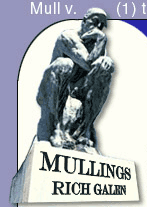|
|

|


Requests, Demands, & Subpoenas
Rich Galen
Thursday April 25, 2019
 Twitter Twitter
Click here for an Easy Print Version
Some of you have emailed (chat@mullings.com) to ask how you can get your copy of Mullings delivered to your own inbox.
Solved
Just click here to SIGN UP FOR MULLINGS and you'll be on the mailing list in time for the next edition.
-----
- According to the U.S. Senate's webpage:
"James Madison, paraphrasing Edmund Randolph, explained in his notes that the Senate's role was "first to protect the people against their rulers [and] secondly to protect the people against the transient impressions into which they themselves might be led."
- Senators were not only elected for six year terms, but until the ratification of the 17th Amendment in 1913, Senators were elected by their state legislatures (not by popular vote), thus keeping Senators away from the day-to-day shifting sands of public opinion which to this very day so vexes their brethren and sistren in the U.S. House.
- It appears there was an understanding, when the Constitution was being drafted, that the House, the Senate and the Executive branches would jealously protect their individual prerogatives. Today, they are more likely to protect the prerogatives of their political party.
- Alas.
- The Judiciary got about deciding what its prerogatives would be on their own with decisions like Marbury vs Madison and McCollough vs Maryland. Thomas Jefferson wrote (haughtily, it seems to me) that in spite of the framers having developed three co-equal branches, only the Judiciary was given
"the right to prescribe rules for the government of the others, and to that one too, which is unelected by, and independent of the nation."
- I am taking us for a ride into the Mullings equivalent of Dr. Peabody's Wayback Machine is this: In spite of my very excellent advice to avoid getting cornered into an Impeachment Proceeding, the House and the President appear to be hurtling directly into that Constitutional collision.
- Let me remind you that the term "impeachment" is the equivalent of an indictment. The House votes on articles of impeachment and, if one or more pass by a simple majority vote, then the matter goes over to the aforementioned U.S. Senate which acts as the jury and must convict by not less than a 2/3 supermajority.
- The Chief Justice of the United States, currently John Roberts, acts as the judge as the two sides present their cases in the Senate Chamber.
- The relevant Constitutional citation comes from Article II, Section 4:
"The President, Vice President and all civil Officers of the United States, shall be removed from Office on Impeachment for, and Conviction of, Treason, Bribery, or other high Crimes and Misdemeanors."
- Various Democrat-led House Committees have requested appearances by former Trump staffers and/or have demanded documents from about 80 people, and/or have issued a subpoenas as for former White House Counsel Don McGahn to appear.
- Ok, so say you get a subpoena to appear before a House Committee but you don't want to go. Turns out that subpoenas, like parking tickets and savings bonds, grow in value the longer you hold onto them.
- If you ignore a subpoena from, say, the U.S. House, the relevant Committee could pass a resolution holding you in contempt (I know, I know, who doesn't hold at least one Branch of the Federal government in contempt) but you know what I'm driving at.
- After the Committee vote, the contempt citation goes to the House (or Senate) floor where, assumedly the same majority that controlled the Committee, controls the Floor of the Chamber and you would be held in contempt.
- So?
- So, according to Lawfare.com:
"Under 2 U.S.C. § 194, the committee and full chamber of Congress must certify the contempt referral, which is sent to a U.S. Attorney 'whose duty it shall be to bring the matter before the grand jury for its action.'"
- Alright, before we try to get even more angels on the head of this pin, suffice it to say that U.S. Attorneys - Republican and Democrat - have been known to ignore taking such things to a grand jury.
- The point of this discussion is: Just this week, according to the Washington Post, Trump said "We're fighting all the subpoenas."
- If Donald Trump orders this week's Attorney General, William Barr, not to enforce a subpoena issued by a House committee nor a contempt resolution adopted by the Democrat-controlled House, would that, in and of itself, be considered impeachable?
- And more to the point, would the Republican-controlled Senate see it as sufficient to convict?
- In the Secret Decoder Ring page today: A packet of links. The U.S. Senate Historian's page, to the word "sistren," to the early history of the Supreme Court, to the Wayback Machine, and to 2 U.S. Code §194.
The Mullfoto has an excellent pun as its caption.
-- END --
Copyright © 2019 Barrington Worldwide, LLC.
All Rights Reserved
Become a
Paid Mullings Subscriber!
Current Issue |
Secret Decoder
Ring | Past
Issues | Email
Rich | Rich
Who?
Copyright ©2013 Barrington Worldwide, LLC | Site design by Campaign
Solutions. | |
|



